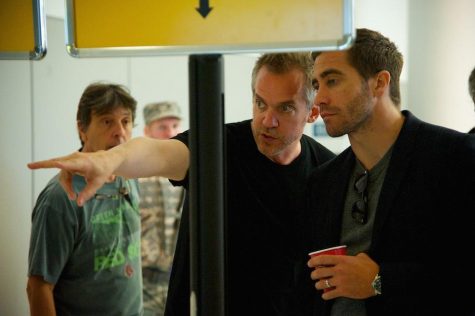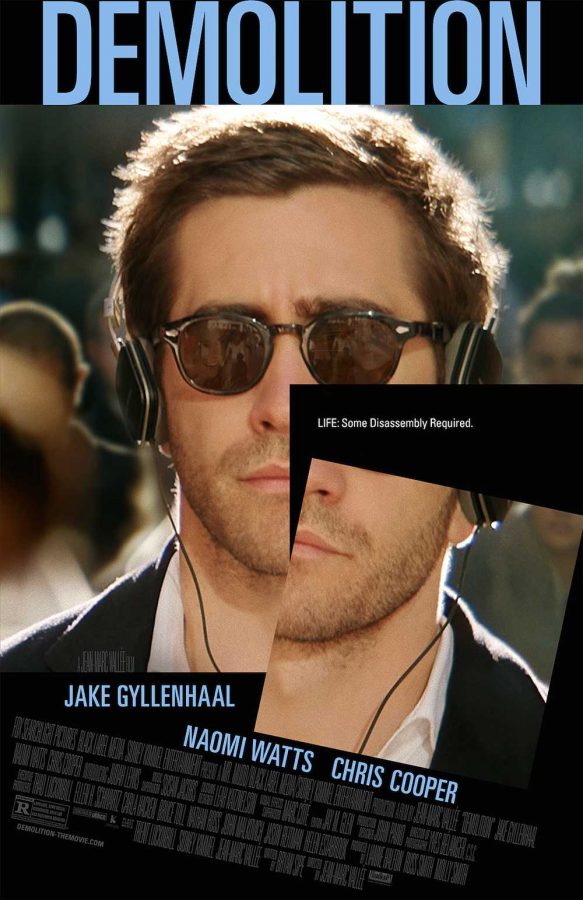‘Demolition’ builds a perfect reality for destruction
Jake Gyllenhaal is brilliant as ever in ‘Demolition’ as he deals with the loss of his wife in an unconventional method.
When a film starts out with a car crash in the first four minutes, expectations are pretty high after that. Only one movie in history has begun with a car crash and gone on to tell a deeply profound and moving story: Amores Perros. Although nowhere near as complex and multifaceted, Demolition is a film about a man struggling to get in touch with his emotions following the sudden death of his wife.
In the style of the French classic Amélie, Demolition takes an average event and builds an entire story around it. Never mind the car crash, the film truly begins when Jake Gyllenhaal’s candy gets stuck in the vending machine. From there on out, he begins sending letters to the customer service department addressing the issue and he eventually strikes up a friendship with one of the representatives of the company (Naomi Watts).

Gyllenhaal told Indiewire that Jean-Marc Vallee pushed him out of his comfort zone
In his last two films, Jean-Marc Vallée has drawn out brilliant performances from his actors, including an Academy Award for Matthew Mcconaughey’s portrayal of a dying AIDS patient in Dallas Buyers Club. Gyllenhaal’s performance in this film is extremely complex and moving. It’s no easy task to pull off a performance in which the primary emotion is indifference in regards to the death of your wife. The norm of any film under that pretext would involve overdone emotional performances that would’ve ruined the authenticity of the film. However, Gyllenhaal’s emotional evolution throughout the film is very subtle and very beautiful in an extremely realistic capacity.
It would also be inequitable to not mention the phenomenal performances of Watts, who changes the entire course of the film regardless of the fact that her dialogue is rather modest in quantity; and the performance of Judah Lewis, Watts’ conflicted son whose relationship with Gyllenhaal’s character is one of the most satisfyingly humane aspects of the entire film. The fantastic Chris Cooper also has a very strong performance in the film as the father of Gyllenhaal’s wife. This makes for some marvelous scenes showcasing the brilliance of Gyllenhaal’s and Cooper’s true talent in their craft.
The film is as visually beautiful as it is emotionally beautiful. The cinematography is mesmerizing and at times creates a very prominent sense of otherworldliness, although the plot is very realistic. The camera is deliberately shaky for a large part of the film, possibly because the title of the film is “demolition” or possible because it’s trying to achieve a more personal experience.
The combination of color and light looks meticulously designed and keeps the stories of these people’s lives vivid and full of life. An abundance of shots against reflective surfaces feels very intimate, making it feel more like we are looking at the world in the perspective of Gyllenhaal’s character which, mind you, is no easy task considering the type of character he plays.
The writing and directing of the film is exquisite as it covers a wide variety of subjects and simultaneously connects all the characters while making them very complex and unique in their own right.
The pace of the film is very well-thought, expertly balancing the main characters’ evolution throughout the film while focusing on details which are often overlooked in films. As a matter of fact, the entire film is heavily dependent on little details as something of a metaphor for how the relationship between Gyllenhaal’s character and his late wife was meant to be as well. By occasionally focusing the camera on details no one ever pays attention to in films, the film symbolizes how Gyllenhaal’s lack of interest in his marriage is his own fault because he overlooked the details in their relationship.
Too often in such films do we see a rush on the director’s part which forces the plot to move forward rather than expand on the humanity of the characters by providing shots of things everyone does every day. By showing the audience a multitude of close-ups and everyday habits, Gyllenhaal’s character, who would otherwise be an insensitive moron, is given very humane characteristics.

Naomi Watts stars alongside Gyllenhaal as he attempts to rebuild his life.
The most attractive aspect of this film is the reality of the character’s’ personalities. Each person carries such heavy weight with them and their presence is highly influential in the plot. What distinguishes this film is the fact that rather than focusing on a defining moment or event, it really stems out and focuses on the characters and the relationships between them. After all, life itself is more about the relationships we build with the people around us rather than the events which prompt us to do so. If we focused primarily on the latter, the former would be redundant.
The objective of any excellent film should be to show an audience a specific moment in time of a character’s life and to do it so that we feel an emotional connection to that character. Admittedly, the audience for this film is not going to be as wide-ranged as, say, Dallas Buyers Club or Wild. However this will hold a special place in the heart for those who love films such as Amélie and Amores Perros. In hindsight, this film could easily be regarded as the American version of Amélie if instead of a love story it was a loss story. Similarly to the two aforementioned modern masterpieces, Demolition fights hard to reach the same level of significance in regards to the human condition. Although it just comes up just a bit short, it’s no doubt a phenomenal story told by a solid director featuring performances which stand out from any film this year.
Rating: 8.8/10

Hobbies/Interests: the playing/listening of music
Favorite Movie: Amores Perros by Alejandro González Iñárritu
Favorite Food: Los Burritos
Plans...












